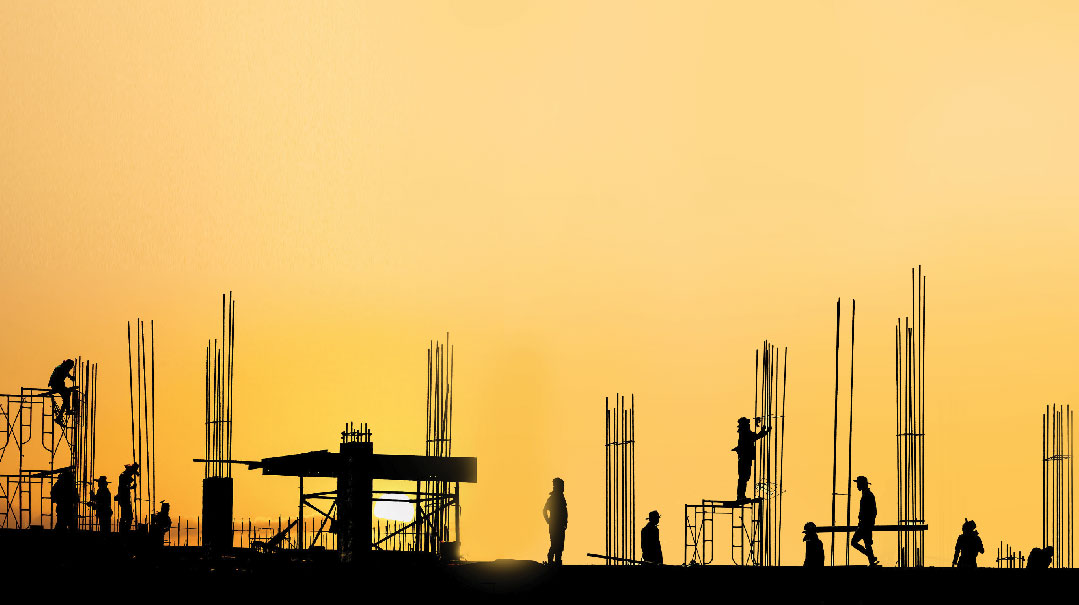For Love of the Land

Something is off if Eretz Yisrael isn’t your default setting

At my Israeli bank, they serve ice cream to the tellers during the Nine Days, because no one is fleishigs then. Only in Israel.
We pray that this year the ice cream will be unnecessary, that the flickers of warm Yiddishkeit — in all of us — flare into the blaze that will cancel Tishah B’Av mourning.
While we’re still in galus, we grapple with how to approach and appreciate Eretz Yisrael. The days of desperate yearning and treacherous journeys are gone; where does that leave us?
Home Is Where the Heart Is
We want to move to Eretz Yisrael, but have been advised by our rav that it’s not right for our family at this point. I know the decision is correct, but I’m so sad about it. I’m unmotivated to do things like expand my house, or even apply for a promotion at work. It all feels empty when this isn’t where I want to be.
If you feel displaced, we can only imagine how upended refugees from Yerushalayim felt in Bavel after the Mikdash was destroyed. Yirmiyahu guided them: “So says Hashem... Build homes and live in them, plant vineyards and eat their fruit, bear sons and daughters, and plan to marry off those children… Seek out peace for the place you are sent to, and pray for it, for when they have peace, so will you.” (Yirmiyahu 49:4–8)
I look no further than my survivor grandparents on one side, and my immigrant great-grandparents on the other, to see how this remains the modus operandi of Jews thousands of years later. Build constructively wherever you find yourself, regardless if you want to be there or not.
But there’s something to keep in mind: Rabbah bar Chana said, “One time we were traveling on a ship and we saw a fish. It had sand on its back and there was grass growing on it, so we thought it was an island. We… baked and cooked on it and when the fish felt the heat, it flipped over. Had a ship not been nearby, we would have drowned.” (Bava Basra 73b)
Mr. Wandering Jew discovers an island to rest his weary bones; so happens it’s a napping sea monster. When he gets heimish, the thing wakes up and throws him off. The message: If we’re in galus and act like guests, we’re okay. When we start feeling too comfy, we’ll need a rude reminder that we’re mis-planted Jews (Maharsha ad loc).
It’s a balance: Live the healthy life described by Yirmyahu without feeling entirely at home. Sure, redo your house, and add the extension so the marrieds can come, but a palazzo? The goal is to be out of here really soon, speedily in our days.
Peacock Chatter
I’ve always imagined retiring to California, but now my husband is insisting it’s disrespectful to choose L.A. over Yerushalayim. I tell him he’ll love the daf yomi there, the shuls are our type, and the weather is similar to Israel’s — why do we have to uproot ourselves to a new country?
There are a number of opinions regarding living in Eretz Yisrael. One is that it’s a mitzvah of opportunity, a mitzvah kiyumis. If you do it, you score, and if you don’t, no penalty. Although not considering it one of the 613 mitzvos, Rambam, who usually carries the deciding vote on these things, strongly encourages living there as a portal to the many mitzvos that can only be done in the land.
If you don’t feel the magic and you don’t “have to,” why bother?
Being in the Land of Israel is compared to a mother’s hug. There’s no law that you must hug your kids, y’know, but it’s unfortunate if someone doesn’t understand why hugs are special. We pray three times a day that Hashem let us see His return to Zion. Kuzari says that if someone isn’t driven to reach Zion, their prayer is like the chattering of peacocks (2:24). Not too complimentary.
The Vilna Gaon (Iggeres HaGra) describes “the Holy Land that everyone yearns to see — the desire of all Jews.” Living in chutz l’Aretz is compared to not having a G-d, or, alternatively, to worshipping idolatry (Kesubos 112b), because G-d sustains the Land directly, while blessing to the rest of the globe goes through intermediaries.
You’re right that it doesn’t contravene Torah law to retire to Pico, or Boca, or Majorca for that matter. And if you do, I wish you a long, healthy, sunny life.
But something is off if Eretz Yisrael isn’t your default setting.
We like to take a nice vacation each year. Israel is the go-to destination for many friends. Honestly, though, been there, done that. I’d much rather go to Panama or Iceland. Am I supposed to feel guilty about that?
If you live in Israel, leaving for a vacation is a question for a posek. (OC 531:4 248:4, Hilchos Melachim 5:9) But what if you don’t? Then the question is about where your heart is, and which magnet pulls you.
When the Ten Tribes were brought to Assyria, they found the cities there as appealing or more so than those they left behind in Shomron (Sanhedrin 94a). Wherever you call home has a special charm (Sotah 47a). When it’s yours, you love it, and if you don’t, it tells of a weak connection. Their enchantment with chutz l’Aretz showed that Eretz Yisrael wasn’t a part of them. It’s the reason they’re disconnected and lost until today (ibid).
It’s beautiful — and telling — that so many Jews consistently recharge in Israel.
Feeling It
I’m in Israel for the summer and it’s awesome. I’m learning tons of history, picking up Hebrew (sababa, achi!), and really seeing that Am Yisrael Chai. It’s weird when the Three Weeks come and I’m supposed to feel sad. I know we have no Beis Hamikdash, but life is good here in the Holy Land.
We’re so blessed and to many, trying to feel exiled seems artificial and forced. But exile isn’t only about Cossacks and marauding crusaders. Murky morals, questions of faith, and the lack of inspiration and connection we keep hearing about are also part of the galus package, a direct result of “Shechinta b’galusa — the exile of G-d’s Presence.” We can all grieve that reality.
Imagine a spectacular wedding. Delectable shmorg, adorable flower girls, great dancing, the works. Small issue: no kallah. Hello?!?
Rav Schwab uses this to demonstrate how we can live in wonderful times, and miss the point. Jewish life is supposed to be a dance around the Shechinah and the Beis Hamikdash. We’re distant from both.
Ads that announce, “Come experience Jerusalem at its height,” or, “The Jerusalem you’ve dreamed of’’ are cringey. When we don’t sufficiently feel it, exile intensifies (Yaavetz, Tishah B’Av), but when the Ribbono shel Olam sees that His people want the real deal Yerushalayim, He’ll give it to them (Kuzari 5:27).
Not That Simple
It’s startling when my sabra cousins refer to other countries as “the Golah, the Exile.” There are so many remarkable aspects of modern Israel. But it’s no secret that many Israelis don’t support Judaism, and there are numerous unresolved painful issues. I can’t believe my cousins think we’ve waited two thousand years to build high-tech companies.
During the Greek exile of the Chanukah story, Jews lived in Israel, so galus and geulah aren’t as simple as geography. In the era of Yeravaam II, phenomenal military success expanded sovereignty from Egypt all the way to Saudi Arabia. The Jews saw this as a sign that Hashem was delighted with them, and Mashiach was imminent. They were incensed when the prophets disagreed and foretold destruction.
Actually, the reason for this unprecedented blessing was that they were spiritually wanting, and were being given the ease and space needed to accomplish the drastic improvement called for. Even when we see miracles, it’s hard to know why G-d is being so kind.
When the second Temple was being rebuilt, the Babylonian Jewish community asked Zecharyah if there was a need to continue fasting for the first Churban or if the exile was over. The majority of Jews were still dispersed. Control over Yerushalayim was tenuous, and most of the country was barren. The community in Babylon was extremely learned, yet they couldn’t figure this one out without a prophet. Zecharyah instructed them not to fast. The Rishonim give a number of reasons for this, but bottom line, exile and redemption have complex halachic parameters.
The establishment of the State of Israel is a massive occurrence. There are those who see the State as unequivocally good because of the realized prophecies and those who see it as unequivocally bad because of the constant struggle to undermine Judaism. Many great rabbis take a more nuanced approach, dealing with the State pragmatically rather than ideologically. The Knesset? If they pass positive legislation, we’re happy, and when Knesset members battle Torah and mitzvos, that’s terrible. Land for peace? It’s a practical question about what will better protect lives.
When beautiful events or poignant moments take place, we need to acknowledge the positive. That said, there’s no mitzvah to be undiscerning, and when Torah is jeopardized we should see that too. And as long as the halachah is that we fast on Tishah B’Av, rest assured that we’re in galus wherever we live.
Why Can’t They Be More Open- Minded?
There’s nothing wrong with what I do, although I admit that my style isn’t exactly Israeli. An exasperated neighbor said to me, “If you can’t keep the standards here, why did you come?” Does she think she has a monopoly on Israel, that it’s more hers than mine? And what if I don’t want to be Israeli?
This question is relevant to olim, young couples, and tourists alike. The last thing we want to do is weaken anyone else’s values and Eretz Yisrael herself is very attuned to our spiritual etiquette. (Vayikra 18: 25,28).
You naturally bring your best self with you. I bet some of your iffy clothing was left behind, perhaps you’ve put a stronger filter on your devices, and packed your Tehillim in an easy to reach pocket of your carry-on. After all of your valiant efforts, the intense Eretz Yisrael spirituality is still challenging and perhaps somewhat uncomfortable.
Even with the thriving economy, baruch Hashem, needs and wants take on a new meaning. Brachos said out loud are commonplace. Emunah is the language that weaves through everything.
You’re in the most sanctified place on earth and it’s time to think beyond assur and muttar to holy and holier. You may never have thought about, say, patronizing only shomer Shabbos attractions or dressing more festively on Chol Hamoed — both givens to most religious Israelis. There are unending possibilities for growth when we’re open to the new and different.
There’s an opinion in the Baalei Tosafos that one shouldn’t come at all. That’s because one isn’t required to live in Israel, but once you do, many mitzvos become obligatory, and it’s easy to bungle them, translating into a spiritual net loss (Kesubos 112). Perhaps this is mentioned so that when we do come, we’ll keep mitzvos like Shemittah and maasros carefully, despite their unfamiliarity (and despite the limited choice of restaurants with reliable mehadrin hashgachah).
If being Israeli means culturally toeing the line, you’ll have to assess that on a case-by-case basis. You don’t want to be socially off, but it’s fine to request serving spoons for dips at the eatery.
The Great Defender
I’m glued to any sort of news about Eretz Yisrael. It’s so frustrating to know that there’s nothing I can do when I see the danger the country is in and how unfairly the world treats us.
Actually, there are several things you can do. We know Israel doesn’t have the same natural cause and effect as other places and the most strategic fortification is metaphysical — see Shema for more details.
Here are a few options if you want to help out.
First, stop talking in shul. Places of tefillah and Torah study will be brought to Eretz Yisrael in the days of Mashiach (Megillah 29a) because shuls and yeshivos anywhere are embassies of sorts, a piece of Eretz Yisrael. During the Second Intifada, the Moetzes Gedolei HaTorah of America put out a call to protect Israel by protecting the holiness of our shuls and yeshivos.
Another possible direction for strengthening Eretz Yisrael: Deal with others compassionately, beyond what they’re legally entitled to. “Do what is right and good in the eyes of Hashem (Devarim, 6:18).” There’s good that goes beyond right, and Rashi elaborates: “This is when you compromise and don’t just uphold strict justice.” This leads us to the end of the pasuk, “and you will inherit the good land...”(ibid). It should be no surprise. Pursuing peace between Jews brings peace closer for Eretz Yisrael, as we were exiled for causeless hatred.
Finally, if you see Jewish cities destroyed, then know cheder rebbis are underpaid (Pesikta Eichah Rabbasi). Torah is the best defense out there (Sotah 21a), so support and encourage Torah scholarship. Even better, learn yourself, to directly protect Eretz Yisrael in the most effective manner there is.
You Get What You Pay For
I live in Israel and am so grateful, but it’s hard. I’m far from family, immersed in a foreign culture, juggling visa appointments and automated answering services in a language I don’t understand. My neighbors think I’m a spoiled American, my apartment is a fraction of the size of any of my sisters’ homes, I hate buses, and I hate the heat. Is complaining about the above a problem?
First, take a deep breath (the air here makes you smart — Bava Basra 158b), keep davening (look out your window to figure out which direction, isn’t that something?), and keep putting one step in front of the other (you get a mitzvah every six feet — Kesubos 111a).
Here are some ideas to ease adjustment:
Ask the veterans. Why care which direction your apartment faces? When are kindergartens off? How do they make it? Financial planning, academic expectations, social cues: Learn the system and avoid lots of bumps.
Learn Hebrew. And speak it. Asking the makolet guy for milk in English is dysfunctional. You’ll be more settled if you can ask for directions, navigate a government office, and read the circulars.
Stay put. Of course you’re maladjusted if you keep flying around. Succos in Eretz Yisrael is gorgeous, bein hazmanim up North is stunning, so why deal with jet lag? Note that Israelis own stockings and makeup; you don’t need thrice yearly trips to stock up.
Move over. Aim for less transience. Eight minutes further on the bus route, out of the cholent pot, rent is lower, there’s space, and neighbors, apartments, and furniture don’t switch up every six months.
Get a job. Boredom makes people cranky. Keeping busy and having a routine is a tried and true panacea for discontent.
Buy a car. It may be financially unrealistic, but it also may be worth pinching elsewhere if possible. It’s a game changer because life feels less foreign with wheels. Maybe you’ll even learn how to maneuver backwards around Geula street corners.
The better the product, the more you give up for it. Living in Eretz Yisrael can be hard, but hard isn’t bad — it’s the way to get good: “Three good gifts were given by Hashem to Yisrael, and they are only given through difficulty: Torah, Eretz Yisrael, and the World-to-Come.” (Berachos 5a)
The spies’ report in the desert remains the root of all exile. Kvetching is certainly a problem. Rabi Chanina would personally fix potholes to prevent people from complaining about roads. Rabi Ammi and Rabi Asi would go from a sunny spot to a shady one, and then switch back. They wanted to ensure that they’d learn comfortably and avoid any chance of speaking badly about the weather in Eretz Yisrael.
How fortunate we are if the words of Calev and Yehoshua echo through us: “The Land we’ve been to and explored is very very good!”
(Originally featured in Family First, Issue 749)
Oops! We could not locate your form.


